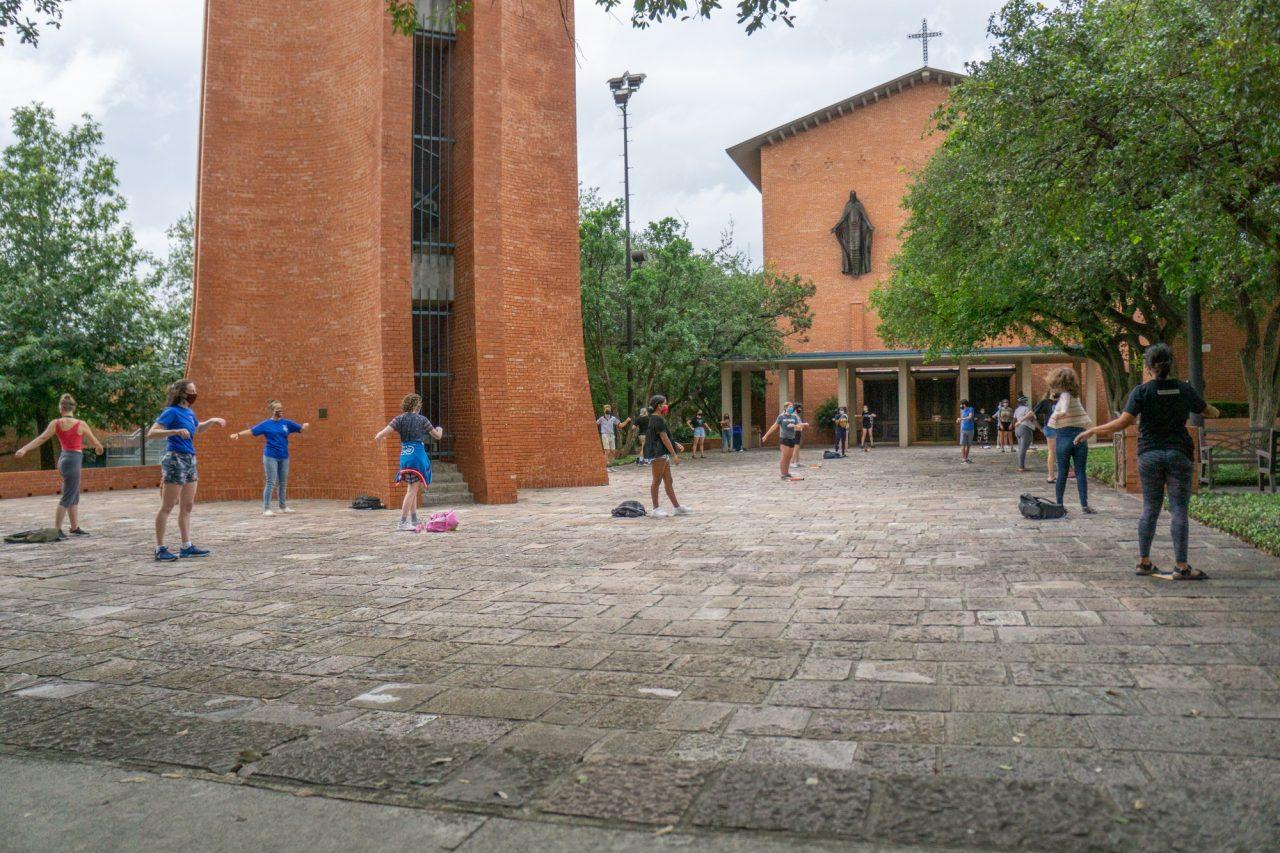photo by Kate Nuelle
Trinity University’s choir program has implemented many changes to abide by health protocols. From rehearsing outside with a 15-foot distance to creating software that minimizes audio lagging, the choir program has drastically shifted their approach to music and rehearsals.
This fall semester, Gary Seighman, associate professor of music and director of choral activities, has been tasked with finding new ways to make rehearsals and performances as smooth as possible, such as alternating between Zoom and outdoor rehearsals.
“I have had an opportunity to be comfortable in thinking outside my comfort zone. This is my twelfth year at the university, and, in some ways, it feels like it’s my first again,” Seighman said.
The choir rehearses Tuesdays and Fridays and alternates between Zoom and a couple in-person, outdoor rehearsals. Despite these setbacks, the choir’s passion and determination rings through. First-year Maggie Webb, a member of the First-Year Choir, views this new change optimistically.
“The whole department has proved how strong and adaptable it is. We are able to rehearse socially distanced or online. Choir is strong, and we will get through this as a team and appreciate what it means to go back to normal,” Webb said. “On another note, it’s so awkward singing in our dorms.”
Junior Emily Warkentin, a member of the Chamber Singers, provides insight on the technical drawbacks of rehearsing.
“Dr. Seighman directs us through a microphone and has a keyboard hooked up to a speaker, and remote students connect with us through Zoom,” Warkentin said. “The biggest challenge is being able to hear both Dr. Seighman and each other. Because of Zoom’s lag, we usually mute ourselves, and when we’re outside, it can be pretty noisy. It’s all a learning process as we continue to figure out what set-ups allow us to replicate some aspects of rehearsing together. No one is expecting perfection, but what keeps us going is that everyone has been so open to try different things and that Dr. Seighman is tirelessly working to bring us together for rehearsals.”
To address the audio lag when rehearsing through Zoom, senior Parker Lacy, a member of the Chamber Singers, created a program that allows for smoother rehearsals.
“Dr. Seighman reached out to me and a couple of the other CS majors in Chamber Singers in late July with questions regarding a software we could use to handle audio better than Zoom. The fact that Zoom only lets one or two people talk at the same time, plus the delay it uses to make sure low connections still work, makes it terrible for a group to sing together. I ended up having some time to do research and Dr. Seighman asked me to ‘officially’ handle it,” Lacy said.
For around three dollars, Lacy used an open-source software called Jamulus, which serves as an audio-only chatroom, and set up a server that starts once remote connections are detected.
“We’re slowly phasing in using Jamulus for the people who are not able to come to campus for in-person rehearsals in outdoor spaces on campus as well as planning sectionals and full rehearsals on some combination of Jamulus and Zoom in the future,” Lacy said.
Due to these roadblocks, Seighman is emphasizing the quality of music rehearsed rather than the quantity of music rehearsed and is exploring emotionally, politically and historically significant pieces.
“In light of George Floyd’s death, we’re doing a program that’s featuring all music by African-American composers and doing a program about half an hour long based on a children’s book by Cozbi Cabrera,” Seighman said.
The upcoming program, My Hair is a Garden, is going to be tackling racial issues through different collaborations with artists and groups.
“We’re aligning with the Black Student Union here on campus and having guest artists from around the country. Going back to business as usual doesn’t seem right right now. As musicians, we can do more to speak to the pain that our country is going through,” Seighman said.
“In all of this uncertainty, change, stress and exhaustion, one constant has been our desire to make music. Art tends to reflect things that are happening in the world, so it’s not really a surprise that our music will look a little different than it has in past years. Instead of just getting through, we’re trying to make something with a purpose, something that does what we always want our music to do: connect to people and connect people with one another,” Warkentin said.
Stay tuned for My Hair is a Garden, to be released on the choir’s YouTube during Thanksgiving weekend.
You can watch the choir’s virtual performances on their YouTube: “Trinity University Choirs”







